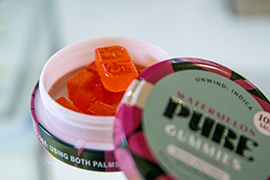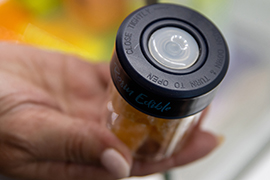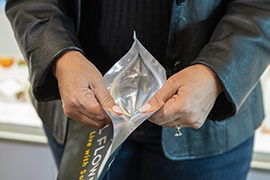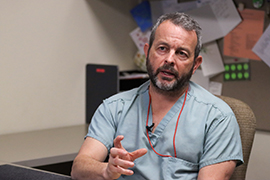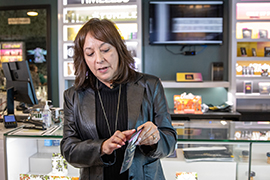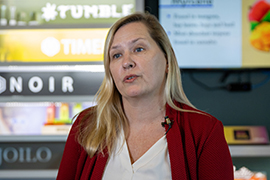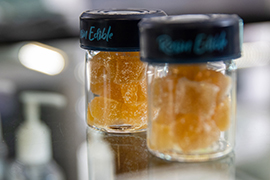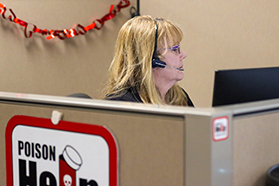- BC-CNS-Safe Cannabis,1050.
- 8 photos, graphic and video story available (thumbnails, captions below)
By Ariana Araiza
Cronkite News
The number of children who mistake edible marijuana for candy is on the rise, with panicked parents calling Arizona poison control centers for help. Nearly 60% of 394 pediatric cannabis incidents last year required a hospital visit, experts said.
Children who eat cannabis can suffer mild symptoms such as becoming drowsy, having trouble walking or acting “inappropriately,” according to Bryan Kuhn, a pharmacist and toxicologist at Banner Health Poison Center in Phoenix. But, it can be worse.
At times, “they’re so drowsy that they can’t be awakened or … their breathing pattern is slower than normal, or in the most rare and serious circumstance, they can develop seizures,” Kuhn said.
Nearly 400 cannabis-related pediatric cases were reported to poison control centers in Phoenix and Tucson, said Maureen Roland, R.N. managing director at Banner Health.
“A high percentage do end up in the emergency room, and a minor amount end up” in intensive care, Roland said. “There are times where we’ve actually had to intubate children and put the breathing tube down their throat and keep them in the ICU overnight.”
Accidental poisonings have been on the rise in Arizona since recreational marijuana was legalized in 2020, similar to other states, according to the Centers for Disease Control and Prevention.
“Since marijuana use has been legalized in some states, accidental marijuana poisonings in children have increased, sometimes requiring visits to the emergency room or hospitalization,” a CDC report says.
It’s illegal in Arizona to sell edibles that might entice children, and packaging is designed to make it difficult for children to open.
Still, as with other common, potentially dangerous household products, parental education is an important part of prevention – including placing cannabis out of reach and being aware of troublesome marketing that ends up targeting children.
“If you do have these products in your home, they are a drug, they are medication, so you need to treat them as such,” Roland said.
Illegal to appeal to children across the U.S.
Ann Torrez, executive director of the Arizona Dispensaries Association, pointed out that state law makes it illegal for edibles to mimic products like children’s candies or snacks. Cannabis contains THC, the substance that delivers the “high” in marijuana.
“There’s no gummy bears, gummy worms at all in the adult-use market in Arizona,” Torrez said. “If you see that type of product, you know it’s coming from an illegal or an unregulated product.”
Manufacturers and dispensaries also must place edible marijuana into child-resistant packaging under Arizona law.
Arizona and 17 other states where recreational marijuana is legal have passed laws that require child-resistant packaging, according to The Network for Public Health Law. However, no federal standards exist and state standards vary. Only three states require plain packaging while three different states require packages that can show whether they’ve been tampered with. Thirteen states ban visuals or text on packages so as to minimize the appeal to children.
But Arizona does not require clear or opaque packaging, tamper-evident packaging or package designs to prohibit words or images that might appeal to children, according to the network.
The Arizona Department of Health Services conducts random dispensary inspections to check whether the laws are being followed.
The U.S. Food and Drug Administration last June issued a statement that it is working with federal and state officials to address concerns about poisonous products that appeal to children.
“The FDA is aware of reports of copycat products packaged to look like… Froot Loops, Fruity Pebbles, Nerds Ropes, Starbursts, Sour Patch Kids, and Trix, among others,” the statement says.
“This should be troubling for all of us, because what this packaging is clearly designed to do, is to trick consumers,” then-Arizona Attorney General Mark Brnovich said in a June press release. “Our kids look at this and think, ‘this looks like the breakfast cereal I eat,’ and they consume something that could be very dangerous to them.”
Educating parents on safe habits
Roland said the edibles poisonings are preventable, with toddlers most likely to be tempted.
“Usually it’s 2-year-olds; 2-year-olds are very curious. They put everything in their mouths pretty much,” Roland said. “And so we want to make sure that you’re keeping them out of sight, in a lock box, not anywhere where the child can see them, because if they are left around, inevitably they will get into them.”
Arizona’s two poison control centers, in Phoenix and Tucson, are working with the Arizona Dispensaries Association on a campaign to teach parents about safe cannabis use and what to do if their child swallows cannabis.
The campaign requires dispensary customers to scan a QR code, posted on windows, that provides a list of accredited dispensaries and other information on the association’s website. The group represents three out of four licensed dispensaries in Arizona, Torrez said.
Parents are advised to treat edibles like household cleansers or weapons – locked away from their children.
“They are either going to mimic behavior that they see a parent or family member do, but they’re also going to put things in the mouth that they have access to,” Kuhn said.
Kuhn said the poison control center is not there to judge or shame parents, but to help during a scary time.
“Every phone call that we take is an opportunity to educate and inform the callers – whether it be the parent or someone calling for themselves or whomever – but ultimately, the prevention methods that we recommend,” Kuhn said.
A national study marks the increase
The journal Pediatrics studied edible marijuana exposures in children under the age of 6 from 2017 to 2021, using the National Poison Data System.
More than 7,000 children were exposed over the five years, with more than 3,000 of those cases in 2021, according to the study, led by Dr. Marit Tweet, a medical toxicologist with the Southern Illinois School of Medicine.
“It presents an important opportunity for education and prevention,” the study says.
In rare cases, parents have been charged. In October, a Virginia grand jury indicted Dorothy Annette Clements on charges of murder and felony child neglect after the May death of her 4-year-old son. Authorities said she did not get help quickly enough after “the child ingested a large amount of THC gummies,” according to a statement.
For more stories from Cronkite News, visit cronkitenews.azpbs.org.
^__=
Arizona law prohibits edibles from being designed to look like children’s candies, such as gummy bears. and marijuana gummies for adults must be labeled with the specific dose on individual gummies and their container. State law limits edibles to a maximum of 10mg of THC per edible and 100mg of THC per package of edibles. (Photo by Emily Mai/Cronkite News)
Many states require that the packaging of cannabis products be child-resistant. Photo taken in Scottsdale. on Jan. 31, 2023. (Photo by Emily Mai/Cronkite News)
All cannabis products from Sol Flower Dispensary leave in reusable double-sealed packaging to help prevent children from accessing their products. (Photo by Emily Mai/Cronkite News)
Bryan Kuhn, a poison information specialist at Banner Health Poison Control Center, says adults need to be aware that children don’t understand the danger of eating an edible that looks like candy. “They are going to mimic behavior that they see a parent or family member do, but they’re also going to put things in the mouth that they have access to.” (Photo by Emily Mai/Cronkite News)
Ann Torrez, executive director of the Arizona Dispensaries Association, says cannabis packages are labeled with the exact contents and dosage of the product. If a child accidentally eats products, parents can tell emergency workers or poison control personnel the ingredients and lab test results to ensure toxins did not contaminate the product. Photo taken in Scottsdale on Jan. 31, 2023. (Photo by Emily Mai/Cronkite News)
Maureen Roland, R.N. managing director at Banner Health, said poison control centers in Arizona received an average of three calls a day about children younger than 5 who have accidentally taken edibles. Photo taken in Scottsdale on Jan. 31, 2023. (Photo by Emily Mai/Cronkite News)
Arizona law prohibits edible marijuana from looking like childhood favorite snacks and candies. Photo taken in Scottsdale. on Jan. 31, 2023. (Photo by Emily Mai/Cronkite News)
Kim Greenlief, administrator assistant at Banner Health Poison Control Center, answers calls at the call center. Photo taken in Phoenix on Feb. 8, 2023. (Photo by Emily Mai/Cronkite News)
